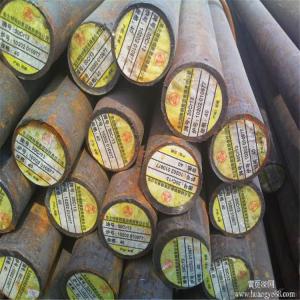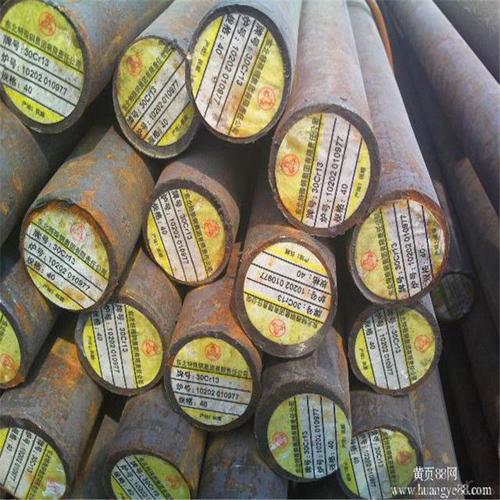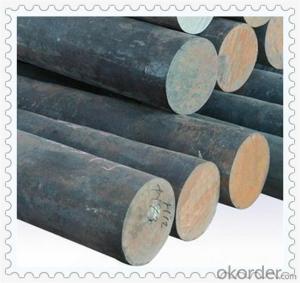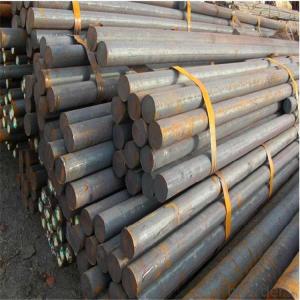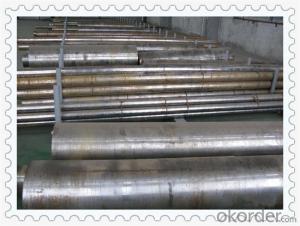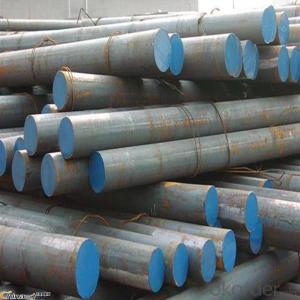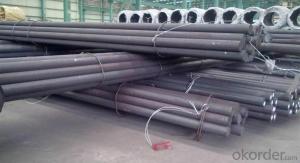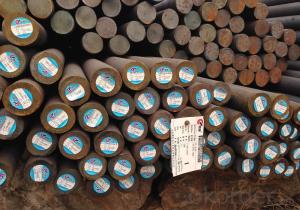AISI4140 Forged Round Bar with Turned Surface
- Loading Port:
- Tianjin
- Payment Terms:
- TT OR LC
- Min Order Qty:
- 100 m.t.
- Supply Capability:
- 50000 m.t./month
OKorder Service Pledge
OKorder Financial Service
You Might Also Like
Specification
AISI4140 Forged Round Bar with Turned Surface
Product Description of AISI4140 Forged Round Bar with Turned Surface
1. Steel grade: ASTM4140, SCM440, 42CrMo, DIN1.7225
2. Length: 6M-12M
3. Diameter: 16mm-300mm
4. Product range: round bar, flat bar, square bar
5. Technique: Hot rolled, forged, cold drawn
Specification of AISI4140 Forged Round Bar with Turned Surface
Material | AISI4140 | Round bar | Dia(mm) | 16-300mm |
Process | EAF + LF + VD + Forged + Heat Treatment (optional) | Length (mm) | Max 12m | |
Heat treatment | Normalized / Annealed / Quenched / tempered | Flat bar | Thickness(mm) | 8-500mm |
Delivery condition | Hot forged +Rough machined (black surface after Q/T)+ Turned (optional) | Width(mm) | 70-200mm | |
Test | Ultrasonic test according to SEP 1921-84 D/d | Length (mm) | Max 12m |
Chemical Composition of AISI4140 Forged Round Bar with Turned Surface
C | Si | Mn | Cr | Mo | P | S |
0.38~0.43 | 0.15~0.35 | 0.75~1.00 | 0.8~1.1 | 0.15~0.25 | ≤0.035 | <0.04< td=""> |
Photo Show of AISI4140 Forged Round Bar with Turned Surface
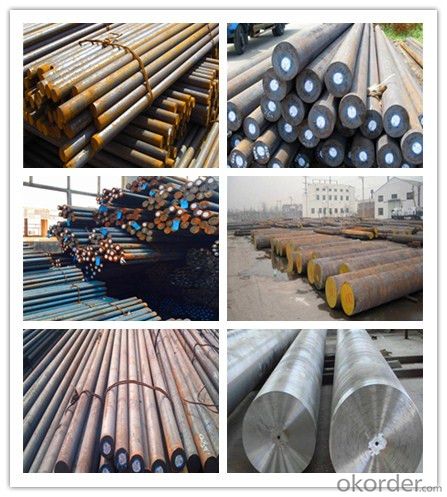
Packing and Delivery:
Packing in bundle package, or as customer's requirements.
Delivery Detail: 45 days after receiving the deposit.
Usage and Applications of AISI4140 Forged Round Bar with Turned Surface
1. Steel round bar is used in a large number of architectural and engineering structures. Or it can be used in construction of plants for the production of steel house frames, high-voltage transmission towers, bridges, vehicles, boilers, containers, ships, etc.
2. And we can use this kind of product on the performance of the mechanical parts if the demand is not very high.
3. Some special material steel round bar can be used for main shaft of steamer, hummer shank, with big section and supper force.
Company Information
CNBM International Corporation is the most important trading platform of CNBM group.
Whith its advantages, CNBM International are mainly concentrate on Cement, Glass, Iron and Steel, Ceramics industries and devotes herself for supplying high qulity series of refractories as well as technical consultancies and logistics solutions.


F A Q
1, Your advantages?
professional products inquiry, products knowledge train (for agents), smooth goods delivery, excellent customer solution proposale
2, Test & Certificate?
SGS test is available, customer inspection before shipping is welcome, third party inspection is no problem
3, Factory or Trading Company?
CNBM is a trading company but we have so many protocol factories and CNBM works as a trading department of these factories. Also CNBM is the holding company of many factories.
4, Payment Terms?
30% TT as deposit and 70% before delivery.
Irrevocable L/C at sight.
5, Trading Terms?
EXW, FOB, CIF, FFR, CNF
6, After-sale Service?
CNBM provides the services and support you need for every step of our cooperation. We're the business partner you can trust.
For any problem, please kindly contact us at any your convenient time.
We'll reply you in our first priority within 24 hours.
- Q: Can steel round bars be used in the manufacturing of fasteners?
- Yes, steel round bars can be used in the manufacturing of fasteners. Round bars can be machined or forged into various types of fasteners such as bolts, screws, and pins. The use of steel round bars provides strength, durability, and resistance to corrosion, making them suitable for fastening applications in various industries.
- Q: Can steel round bars be used for making punches and dies?
- Certainly! Punches and dies can indeed be fashioned from steel round bars. In the realm of tool and die fabrication, steel round bars are frequently employed owing to their robustness and durability. These bars can be skillfully machined or forged into the desired configuration, subsequently bolstered to guarantee extended longevity and fortitude against wear and distortion. The commendable hardness and tenacity of steel round bars render them optimal for withstanding the formidable forces and pressures entailed in the act of punching and shaping diverse materials. Moreover, steel round bars are easily obtainable in an assortment of dimensions and grades, rendering them a judicious and cost-efficient option for producing punches and dies.
- Q: What is the difference between a centerless ground and a precision ground steel round bar?
- The main difference between a centerless ground and a precision ground steel round bar lies in the manufacturing process and the resulting quality of the finished product. A centerless ground steel round bar is manufactured using a machining technique called centerless grinding. In this process, the steel bar is placed between two grinding wheels, one rotating at a high speed and the other stationary. The rotating wheel removes material from the bar's surface, creating a smooth and evenly-sized round shape. Centerless grinding is known for its ability to produce bars with tight tolerances and excellent surface finish. On the other hand, a precision ground steel round bar is manufactured using a different process called precision grinding. In precision grinding, the steel bar is held in a chuck or fixture and rotated against a grinding wheel. The grinding wheel removes material from the bar's surface, creating a precise round shape with tight tolerances. Precision grinding is often used when a higher level of accuracy is required, such as in applications where the bar will be used as a critical component in machinery or tools. In summary, both centerless ground and precision ground steel round bars offer a high level of dimensional accuracy and surface finish. However, centerless grinding is a more efficient and cost-effective process for producing large quantities of round bars with consistent quality, while precision grinding is preferred for applications that require the highest level of dimensional accuracy and surface finish.
- Q: Can steel round bars be used for making springs or suspension components?
- Yes, steel round bars can be used for making springs or suspension components. Steel is a commonly used material for these applications due to its high strength, durability, and ability to handle heavy loads. The round shape of the bars allows for easy fabrication into various spring designs or suspension components. Additionally, steel can be heat-treated to improve its elasticity and resistance to fatigue, which are important characteristics for springs and suspension systems. Overall, steel round bars provide a reliable option for manufacturing springs and suspension components that can withstand the demands of these applications.
- Q: Can steel round bars be used for making propeller shafts?
- Yes, steel round bars can be used for making propeller shafts. Steel is a common material choice for propeller shafts due to its strength, durability, and resistance to corrosion. The round shape of the steel bar allows for efficient transfer of rotational energy, making it suitable for propeller shafts in various applications.
- Q: What are the different types of steel round bars used in the marine industry?
- Various applications in the marine industry require the use of different types of steel round bars. These round bars are specifically designed to withstand the challenging marine environment and offer high strength and resistance to corrosion. 1. Stainless Steel Round Bars: Due to their exceptional corrosion resistance, stainless steel round bars are extensively used in the marine industry. They can endure saltwater, acids, and other corrosive elements commonly found in the marine environment. Marine fittings, fasteners, and propeller shafts are among the common uses for stainless steel round bars. 2. Carbon Steel Round Bars: Known for their durability and high strength, carbon steel round bars find application in various marine fields such as shipbuilding, offshore structure construction, and marine equipment fabrication. Different grades of carbon steel round bars are available, with higher carbon content providing increased strength and hardness. 3. Alloy Steel Round Bars: Mechanical properties of alloy steel round bars are enhanced by combining various elements like chromium, nickel, and molybdenum with carbon steel. These bars offer excellent strength, toughness, and resistance to corrosion. Marine shafts, gears, and structural components typically make use of alloy steel round bars. 4. Duplex Stainless Steel Round Bars: Combining the properties of austenitic and ferritic stainless steels, duplex stainless steel round bars offer superior corrosion resistance and high strength, making them ideal for marine applications. Offshore platforms, marine vessels, and underwater equipment often utilize duplex stainless steel round bars. 5. Nickel Alloy Round Bars: Nickel alloy round bars are particularly notable for their exceptional resistance to corrosion and ability to withstand high-temperature environments. They are crucial in marine applications where strength, durability, and resistance to corrosive elements are essential. Marine valves, pumps, and heat exchangers frequently employ nickel alloy round bars. Each type of steel round bar used in the marine industry possesses its own unique properties and advantages. The selection of the appropriate steel round bar depends on the specific requirements and application of the marine project.
- Q: What is the maximum length of a steel round bar available?
- The maximum length of a steel round bar available depends on various factors such as the manufacturing capabilities of the steel supplier, transportation limitations, and practical considerations. However, typical maximum lengths range from 20 to 40 feet (6 to 12 meters), but it is always best to consult with a steel supplier to determine the specific lengths they offer.
- Q: What are steel round bars?
- Steel round bars are long, cylindrical metal bars that are made from steel. They are commonly used in various industries such as construction, manufacturing, and engineering. These bars are known for their strength, durability, and versatility. Steel round bars are typically produced through a hot rolling process, where a solid steel billet is heated and passed through a series of rollers to achieve the desired shape and size. They come in a range of sizes and grades, with different properties depending on the specific application. These bars are often used as structural components in buildings, as shafts in machinery, as support bars in concrete structures, and as raw material for the production of other steel products. Due to their high tensile strength and resistance to corrosion, steel round bars are widely preferred in the construction and manufacturing sectors.
- Q: What is the difference between a polished and a cold drawn steel round bar?
- A polished steel round bar refers to a steel bar that has undergone a polishing process, which involves using abrasive materials to remove any surface imperfections and create a smooth, shiny finish. Polishing enhances the aesthetic appearance of the steel bar and improves its corrosion resistance. This process is commonly used for decorative or architectural applications where the visual appeal is important. On the other hand, a cold drawn steel round bar is produced through a different manufacturing process. In this method, a steel bar is pulled through a die at room temperature to reduce its diameter and increase its length. This process results in a bar with a more precise and uniform diameter, as well as improved mechanical properties such as higher tensile strength and dimensional accuracy. Cold drawing also enhances the surface finish, but it may not achieve the same level of smoothness and shine as a polished bar. In summary, the main difference between a polished and a cold drawn steel round bar lies in the manufacturing process and the resulting properties. Polishing provides a smooth and shiny finish for aesthetic purposes, while cold drawing improves the dimensional accuracy and mechanical properties of the steel bar.
- Q: Are steel round bars suitable for the manufacturing of shafts?
- Indeed, steel round bars prove to be fitting for the production of shafts. Renowned for their robustness, longevity, and capacity to endure immense loads and rapid rotations, steel round bars excel in applications involving shafts. The circular form of the bar fosters even distribution of stress, thereby diminishing the likelihood of failure or distortion. Moreover, steel round bars can be easily manipulated and subjected to heat treatment in order to attain desired mechanical properties, such as hardness and toughness, thereby reinforcing their aptness for shaft production. All in all, steel round bars encompass the essential attributes demanded by shafts, thereby rendering them a trustworthy and widely employed material in diverse industries.
Send your message to us
AISI4140 Forged Round Bar with Turned Surface
- Loading Port:
- Tianjin
- Payment Terms:
- TT OR LC
- Min Order Qty:
- 100 m.t.
- Supply Capability:
- 50000 m.t./month
OKorder Service Pledge
OKorder Financial Service
Similar products
Hot products
Hot Searches
Related keywords
